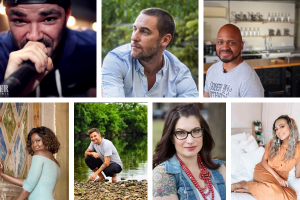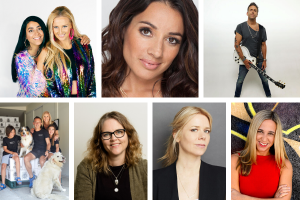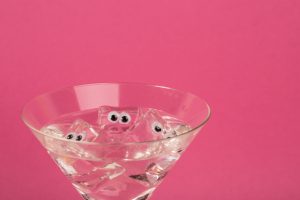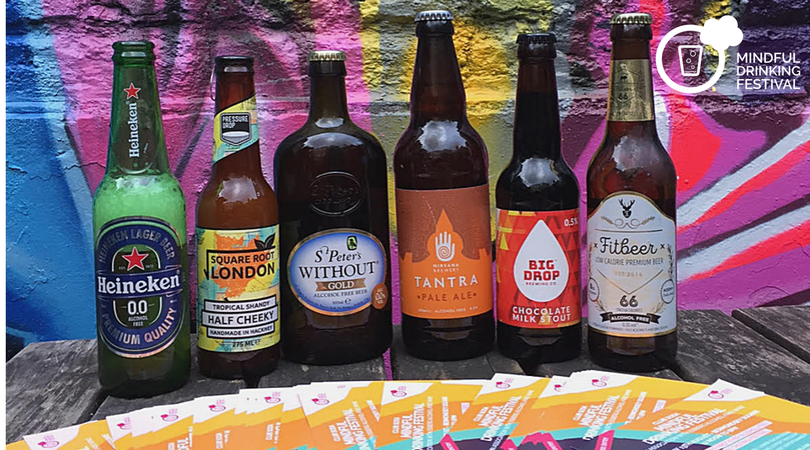
Every beer at our festival has a story
Alcohol-free beers (0.5% and below is deemed alcohol-free by us) have come a long way in the last few years with the choices becoming bigger, better and more widely available. The craft beer sector has been flooded with inventive, flavoursome, aesthetically pleasing packaged options for years now, with brewers often aiming to make beers as high in strength as they are in flavour. Now there are entire breweries dedicated to the production of low and no alcohol beers, and brewers at our favourite craft brands are competing to bring the strength of their beers as low as possible, without losing any of the taste or complexity – giving the full strength options a run for their money. So what inspired this movement, and where will it end up? I spoke to the founders of the beer lineup at our Mindful Drinking Festival in July 2018 to find out.
Festival sponsors Heineken took two years to perfect their 0.0 beer. You can hear more about that process from their Global Master Brewer Willem van Waesberghe (speaking at our very first festival in August 2017):
Big Drop Brewing Co – Rob Fink
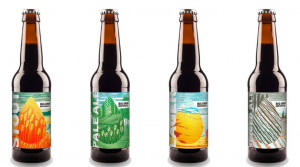
What inspired you to create Big Drop?
My inspiration came after my first son was born, when I wanted to make some lifestyle changes to react to my new family responsibilities. One of those changes was to cut back a little on what I drank but was dismayed to find that the choice for non-drinkers seemed to revolve around sugary cola, lemonade or an occasional fruit juice. I still fancied the occasional beer and was disappointed at the range of options available if you didn’t want a standard alcohol version; in fact, there weren’t any realistic choices that were low in alcohol but high in taste.
I did some research and found that there was a gap in the market, so decided that if I wanted to drink a beer that was low in alcohol, yet had real depth of flavour, I’d have to brew my own. I teamed up with an old school friend, James Kindred, who’s a design guru and we were introduced to brewer Johnny Clayton, one of the best experimental brewers in the country. Big Drop was created and the rest, as we say, is history in the making.
What changes have you seen in the “mindful drinking” scene/industry and the attitude to alcohol-free beer since you started the brand?
In the two years since Big Drop was formed, the alcohol-free market has changed beyond recognition and there are a host of brand owners launching new products that include soft drinks, sodas, wines, and spirits as well as beer. Non-drinkers now have more choice than ever and are being taken seriously with a range of drinks available in their own right, not as an after-thought or a bolt on to a full-strength offering just to tick the responsibility box.
When I founded Big Drop I was warned that there wasn’t a demand for no and low alcohol beers. I knew that there was but that no-one was listening. In just two years, the mindful drinking scene has become established, acceptable and, with one in five people now stating that they don’t drink, more commonplace. There’s been a sharp rise in the number of retailers stocking low alcohol beers, and even specialising, in the category and groups such as Club Soda have made a hugely positive impact on the mindful drinking movement.
Where would you like to see the brand in two years from now and what do you think is needed to get there?
Big Drop beers are established as market leaders and we were the first brewer to exclusively produce beers that were no more than 0.5%ABV. We made people sit up and take notice when our Pale Ale was named World’s Best Pale Ale (low strength) at the 2017 Worlds Beer Awards and Stout was awarded a UK silver medal when judged against full strength stouts and porters. Our beer selection is expanding with the core range of Pale Ale, Stout and Lager supported by a changing seasonal portfolio that has so far included Spiced Ale and Sour and we’ll continue to experiment and launch new styles in keeping with customer demand.
There’s a wonderful opportunity to lead the field in overseas markets, as other countries don’t seem to have reacted to changing consumer behaviours as quickly as the British. We’ve already seen high demand in Europe, Asia and North America and expect this to increase further in the next 12-24 months, particularly if the voices of consumers who are contacting us via social media asking about our beers are heard by overseas distributors.
We have good listings with online retailers and bottle shops in the UK which form the foundation of our distribution, but we are also stocked in a growing number of premium restaurants including Hakkasan, Fortnum & Mason and The Ivy Collection. You can also buy a Big Drop beer in Mitchells & Butlers All Bar One and Castle bars and we’ll be announcing a major supermarket listing soon so have already made progress in achieving wide-spread accessibility. Our aim is to grow this further over the next couple of years to ensure that anybody who chooses not to drink alcohol, for whatever reason, is able to get hold of a great tasting 0.5% ABV beer wherever and whenever they want one. I want to see stocking a range of flavoursome no and low alcohol beers become the norm, not the exception but we need more bar owners to take the plunge and give increased visibility in fridges and on the shelf so that customers are aware of the choice available. There is a demand within this category, but if the beers are hidden away somewhere where no-one can see them, sales won’t reflect the potential it offers.
There’s been a huge sea-change of opinion and variety and the market today is unrecognisable from where it was two years ago. We’ll continue to brew great beers that offer a credible option for non-drinkers and work with retailers and operators to get them into the hands of those who want to moderate their alcohol consumption but don’t want to compromise on taste.
Infinite Session – Chris Hannaway
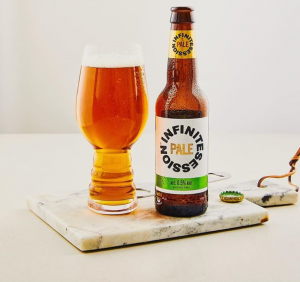 What inspired you to create Infinite Session?
What inspired you to create Infinite Session?
We love everything about beer and wanted to be able to drink more of it, without the hangovers or health consequences. We couldn’t find anything with the flavour and full beer experience that we were after.
What changes have you seen in the “mindful drinking” scene in the last couple of years?
People are definitely becoming a lot more open-minded. I think that’s helped by progress made in wider society, but also because the quality of products has improved. If alcohol-free beers still tasted like muck, I wouldn’t blame people for giving them a mess, but luckily I think we’ve come a long way!
Where would you like to see the brand in two years from now and what do you think is needed to get there?
I think we want to see the drinker’s experience continue to come closer to that of regular strength beers, that’s our goal. We’re happy with the start that we’ve made with our beer, but I’d like to think we can keep improving it and making breakthroughs in quality. To get there, I think we need a bit of time, focus and support from the industry as a whole – from suppliers/partners to keep innovating and retailers/customers to see the true potential of alcohol-free and support our journey whilst we work to get there.
Nirvana Brewery – Steve Dass
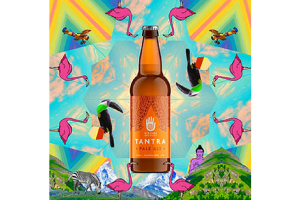 What inspired you to create Nirvana beers?
What inspired you to create Nirvana beers?
Couple of things: Firstly, a few years ago due to health reasons I had a long period of being dry – working in the industry and the social circle did make it difficult initially, which I was strong enough for but what I could not understand was that being surrounded by great craft beer, the alcohol-free sector offered pretty bland and boring options. Boring in terms of branding and bland in taste. Craft changed everything, peoples outlook on breweries and branding of beer and of course, a thriving industry respected around the world.
I was fed up with these faceless multinationals churning out bland boring beers, and not offering a decent product to those of us that can’t drink full-strength beer.
I immediately discovered from speaking to others and also chats on social media, that I was not the only one finding this sector difficult to enjoy. We needed innovation! So 3 years ago I decided that alcohol-free needed a mixup – my friends thought I’d bumped my head – just like our craft friends (Brodies, Thornbridge, Marble, BrewDog) did in 2008!
When I started to work on the project to brew beers, I then decided our beers will not just be for folk that can’t drink due to health reasons, but to create an option for those of us that are looking for a lower ABV alternative to enjoy any time of the day!
What changes have you seen in the “mindful drinking” scene/industry and the attitude to alcohol-free beer since you started the brand?
When we launched I think we shocked the market, first we needed to get the trade to understand alcohol-free is not a rude word! We are not telling people to stop drinking and close pubs – quite the opposite. So when we hit the market, in a way wholesalers and distributors reaction was “alcohol-free beer??!! WHY?!” Then as we started to filter out the beers, the press surrounding the alcohol-free sector which came was a bonus for us (right place right time) and more and more trade enquiries came through.
I think also our distributors and retailers realised that this sector actually has a huge demand – not as much as the rest of the craft category but enough to make it a viable growth sector. Buyers also respect that we don’t say “don’t drink beer” (we’ve enough friend brewers in the industry I don’t aim to wind up) and our beer is an option that can sit alongside the crazy array of beer styles. We’re all about good vibes here at Nirvana!
What has been good is that brands like ourselves that have recently started have helped to fuel the press with awareness, and ultimately make the consumer aware there is a choice for you – there are brands like Nirvana focused on you, and have made it their mission to offer products that are a better option!
Friends in the beer industry are also realising that this sector is not to be ignored, with recently a couple of craft breweries offering an alcohol-free option. It’s about satisfying the consumer and I think so far they are becoming satisfied with what’s on offer, and the greater audience is realising “mindful drinking” is not a fad!
Where would you like to see the brand in two years from now and what do you think is needed to get there?
Having the same level of fun and being even more creative in our beers and our brand awareness. I’d like to see us continuing our ethos of brewing alcohol free beers, free from chemical enhancements, brewed naturally, and vegan – the way we started.
I’d have hoped to have grown our distribution to a wider audience here in the UK, which was our goal from day one – and to have achieved international presence and share the Nirvana good vibes!
I’d like to see a better perception of alcohol-free and ultimately it would feel good at that time knowing we played a huge part towards a sector of the industry that had no MOJO!
To get us there… Simple – we would just need to continue to brew the beers with the same passion and principles, continue to receive good vibes from our customers. All good Karma.
Fitbeer – Becky Kean
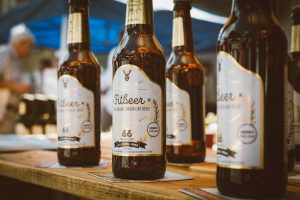 What inspired you to create Fitbeer?
What inspired you to create Fitbeer?
The inspiration came from our father. He was in recovery from alcoholism when he started drinking alcohol-free beers. He enjoyed the taste of beer but struggled to find an AF one that he actually liked! We set out on a mission to create one that he could enjoy; something that had the same quality and was made with the same care and attention as a proper craft beer, and that tasted just as good as its alcoholic counterpart. Needless to say he’s a very satisfied customer!
What changes have you seen in the “mindful drinking” scene/industry and the attitude toward alcohol-free beer since you started the brand?
The changes in the industry since we’ve started have been huge. In the beginning, we faced a lot of resistance from bars and pubs who told us ‘no-one is buying alcohol-free beer’ and ‘people just want to get drunk’. The reaction we get these days is such more likely to be ‘oh yeah, we get people asking for it all the time’! It’s so refreshing, and that response is becoming much more common now. More people understand now how drinking habits are changing and are happy to embrace it. For the consumer side, we’ve also seen a big increase in people’s expectations of the AF options establishments should be providing. The standards have been raised, and now that more consumers are aware of it, they’re putting the pressure on businesses to stock them, which is great for us!
Where would you like to see the brand in two years from now and what do you think is needed to get there?
We would like to see the brand out there in the bars and shops where people can find it easily in their daily lives. Having a fridge stocked with some ice cold Fitbeers ready to crack open after a long day at work, or in your local pub when you pop in for an impromptu night out with your mates makes abstaining from alcohol a joy and not a struggle. We know there is a vast number of people out there who want our beer, but at the moment we are only reaching a portion of them! We can get there, if we keep spreading the word amongst the industry that the demand is real! We’re also keeping our fingers crossed for a common sense change in the labelling regulations to define 0.5% as alcohol free. It would clear up a huge area of confusion within the industry and amongst consumers and would bring us in line with the rest of the EU and beyond, undoubtedly giving a big boost to demand for this category.
Braxzz – James Leary
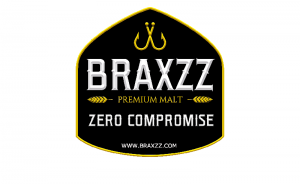 What inspired you to create Braxzz alcohol-free beers?
What inspired you to create Braxzz alcohol-free beers?
Our journey began with two simple passions: Firstly, to improve the taste profile of non-alcoholic beers and secondly to improve the variety for consumers in this category
We quickly realized that a breakthrough was not going to be possible without true innovations, so we built an experienced team which includes a member of one of the biggest beer families in the world
We are proud of our innovation and it is because of this innovative power that we named our product after the latin brewmasters (the braxators) who accidentally invented beer, as they used alcohol to kill common waterborne bacteria.
What changes have you seen in the “mindful drinking” scene/industry in the last couple of years?
The key changes have been the attitude towards drinking particularly amongst young people where all the studies show that the 16-24 age category is less likely to drink alcohol than any other age category.
Companies nationally are also more keen to promote a responsible drinking culture as part of their strategy which is to the advantage of all alcohol-free and low alcohol brands.
Where would you like to see the brand in two years from now and what do you think is needed to get there?
We are continually expanding and improving our range. We have produced the world’s first alcohol-free porter, 3 x IPA variations, a Cider and a Triple already all of great quality and this is just the start. In 2 years we want to be recognised as the no. 1 alcohol-free craft beer brand for consumers in the market and will continue to work hard, creating and innovating until we achieve this.
St Peter’s Brewery (Without®) – Steve Magnall
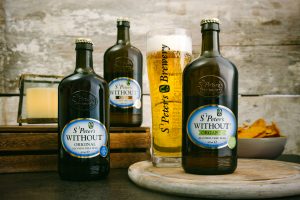 What inspired you to create St Peter’s Without®?
What inspired you to create St Peter’s Without®?
The inspiration behind Without® came from our founder, John Murphy. When John had cancer he’d had to give up alcohol and was so disappointed in the range of zero alcohol beers available that he decided St Peter’s should brew its own. It took almost three years of careful brewing and testing to produce Without and what we created was a beer that is brewed in exactly the same way as our usual craft ales, just without alcohol. It is rich, full bodied and full of flavour, just like your usual pint.
What changes have you seen in the “mindful drinking” scene/industry and the attitude to alcohol-free beer since you started the brand?
We launched Without® in July 2016 at a time when there were very few zero alcohol beers available – only really imported ones. Without® was the very first zero alcohol craft beer and it really set the industry alight. Since then there’s been so much innovation in the sector, although many are 0.5% alcohol rather than zero, but it’s great to see such a sea change both within the brewing industry and in the overall perception of no and low alcohol drinks in both retail and the ontrade. This category is now truly being taken seriously and consumers are finally getting the choice they deserve. Since developing Without® Original, we’ve also introduced Without® Gold and Without® Organic, which proves there’s a huge demand for innovation and choice.
Where would you like to see the brand in two years from now and what do you think is needed to get there?
We would like to continue to develop our UK and overseas sales and push the brand out to more pubs and bars, as well as retail. Our sales of Without now make up 30% of our overall sales and account for 10% of the UK’s no and low alcohol beer sales. In fact, the brand has been so successful that we’ve just installed a new bottling line and bought more land in order to expand the brewery to keep up with the huge demand.
Feedback from our customers is fantastic and sales through our range of retailers are buoyant. We just want to continue to grow, innovate and develop the brand and continue to give customers a truly delicious and truly alcohol-free beer.

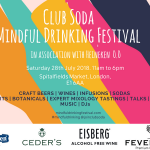 Previous Post
Previous Post
